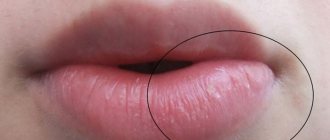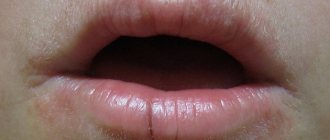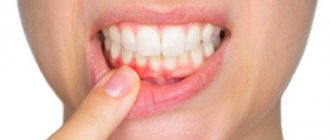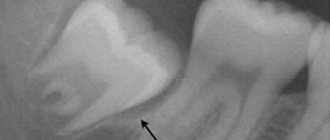What is allergic stomatitis?
Allergic stomatitis is called inflammation of the mucous membrane, provoked by hypersensitivity to certain irritants. A distinctive feature of the disease is a long incubation period. That is, from the moment an allergic reaction occurs until the first signs of stomatitis appear, up to four weeks can pass. In general, read about what stomatitis is in a separate article.
People of any gender and age are susceptible to the disease, but people with allergies, workers in hazardous industries and residents of areas with poor ecology are at risk.
Causes of allergic pharyngitis:
- strong odors (perfumes and chemical sprays, cigarette smoke and exhaust fumes);
- flowering period;
- book and house dust;
- pet hair;
- Food;
- medicines.
The development of the disease is often influenced by heredity, weak immunity, and chronic foci of infection. Allergic pharyngitis can also be triggered by hypothermia, smoking, etc. People who work in the production of chemicals are often at risk.
Symptoms of allergic stomatitis
Symptoms of allergic stomatitis in adults and children appear even at the initial stage of the pathology; the disease from the first days negatively affects the condition of the patient’s entire body.
Common signs of allergic stomatitis in the mouth include:
- itching and burning of the mucous membrane;
- pain when chewing;
- dry mouth;
- viscous saliva, similar in consistency to foam;
- swelling of the tongue, gums, swelling of the cheeks;
- fever and headache are possible.
Stages of the disease
- catarrhal allergic stomatitis - the initial form, characterized by dryness and burning in the mouth, without ulcers and plaque;
- bullous allergic stomatitis is the next stage, in which clusters of bubbles with cloudy liquid form on the surface of the mucosa;
- ulcerative necrotizing stomatitis is the most serious form, accompanied by severe pain, redness and swelling of the mucous membrane, and numerous ulcers with a gray coating.
3. Symptoms and diagnosis
Regardless of the etiopathogenetic mechanism (allergic or congenital), Quincke's edema manifests itself primarily as severe swelling of the subcutaneous tissue and mucous membranes, mainly in the face and neck; The triad in the title of the article is especially noticeable. Swelling of the genitals, hands, feet, and internal organs is less common. Angioedema differs from similar conditions (the same urticaria) by the absence of itching and a more pronounced vascular reaction. However, many patients note a burning sensation or other noticeable discomfort.
Swelling of the larynx and structures of the respiratory system is very dangerous: sudden suffocation, stridor (wheezing) breathing and acute oxygen starvation occur, which can be fatal.
The clinical picture forms very quickly - within a few minutes or, maximum, 1.5-2 hours.
For a doctor, angioedema does not present diagnostic difficulties, as well as for a non-specialist who has at least once seen this condition with his own eyes. After visiting a doctor, allergy tests are prescribed, and the anamnesis is carefully studied in order to clarify the hereditary or allergic etiology.
About our clinic Chistye Prudy metro station Medintercom page!
Causes of development of allergic stomatitis
The main cause of pathology is the entry of an allergen into the body. Allergies can occur due to taking antibiotics, insect bites, accumulation of dust, food or contact with materials. Depending on the cause, there are several types of allergic stomatitis.
Contact allergic stomatitis
Occurs due to the effect of drugs and materials on the mucous membrane, for example, orthodontic apparatus, prosthesis or cement for its installation. The formations are usually located only at the site of contact of the mucous membrane with the irritant. A distinctive sign is swelling of the cervical lymph nodes.
Toxic-allergic stomatitis
Appears when pathogenic organisms multiply in the oral cavity, causing toxic poisoning. It is characterized by swelling of the mucous membrane, milky or brownish coating on the tongue.
Drug-induced allergic stomatitis
Develops after taking medications orally or when applied topically. Accompanied by nausea, headache, difficulty breathing, fever and numerous rashes. With drug-induced stomatitis, it is necessary to first relieve the symptoms of intoxication and only then treat the external manifestations of the pathology.
2. Reasons
Angioedema type 1 is usually associated with an acute allergic reaction localized in the upper part of the body and occurring in response to contact with a provoking substance. It can develop both independently and against the background of a provoked allergic status - for example, with urticaria, hay fever, etc. In general, Quincke's edema is most often compared with urticaria, although in the second case the reaction from the skin is not so deep and pronounced.
Another, non-allergic form of angioedema is caused by inherited dysfunction of the immune system, as a result of which a violent and inadequate immune reaction can occur suddenly, spontaneously, in response to almost any more or less intense irritant (for example, cold or hot air, chemical fumes, etc. .).
Visit our Allergology page
Diagnostics
First of all, a visual examination is carried out: the dentist assesses the condition of the mucous membrane, looks for the presence of dentures, fillings and other materials that could become allergens. Then the doctor finds out the time of the first signs of the disease, the patient’s general well-being and possible factors of the disease: heredity, allergies, medication, diet, trips to other countries, contact with animals and insects. If allergic stomatitis is confirmed, tests are performed to clarify the allergen:
- study of the composition of saliva;
- sample from dentures or dental materials;
- immunogram;
- blood and urine tests.
Allergic pharyngitis. Diagnostics
An otolaryngologist can diagnose pharyngitis through a visual examination, but the type and nature of the allergen is determined by an allergist. Therefore, you need advice from two specialists at once.
Diagnosis of this disease includes the following studies:
- collection of anamnesis of the disease;
- pharyngoscopy, which allows you to examine the back of the throat for swelling and mucus formation;
- skin tests (detect the presence of patient hypersensitivity to the agent);
- laboratory tests for various allergens.
1 Pharyngoscopy - examination of the pharynx by an otolaryngologist at MedicCity
2 Pharyngoscopy - examination of the pharynx by an otolaryngologist at MedicCity
3 Laboratory diagnosis of allergic pharyngitis
Treatment of allergic stomatitis
Treatment involves eliminating the allergen, restoring the immune system and healing the mucosal tissue. The doctor prescribes antiallergic drugs, analgesics for severe pain, drugs to strengthen the immune system and ointments (Kamistad, Cholisal) to treat ulcers. It is important to avoid contact with the allergen: stop taking certain medications, remove certain foods from your diet, temporarily remove dentures, change oral care medications. The duration of treatment, as a rule, does not exceed 14 days, but in severe cases of the disease it can be extended by the attending physician.
To alleviate the patient’s condition, you can use traditional methods of treatment, but only after consulting a dentist:
- rinsing with cabbage juice, chamomile decoctions, aloe tinctures;
- treatment of affected areas with sea buckthorn oil;
- applying grated potatoes to the ulcers.
The principle of treatment of allergic stomatitis in adult and small patients is no different; the difference lies in the drugs. Depending on the age of the child, the doctor chooses more gentle medications or prescribes only medications for external treatment. Read more about the treatment of various types of stomatitis here.
1.General information
If you see a person’s face rapidly swelling, especially in the area of the eyelids and lips, the first thing that should come to mind is Quincke’s edema.
Acutely developing angioedema (neurovascular) edema is named after the German physician Heinrich Quincke, who gave the first detailed clinical description in 1882 (casuistic references to similar conditions have been found before). It is interesting that the term “Quincke’s edema” is used mainly in German- and Russian-speaking medicine, while in international English terminology they usually talk about “angioedema”.
Angioedema is one of the specific types of hypersensitivity reaction and can occur in any of us, regardless of age and gender. However, the predominance of young women (20-30 years old) among those with diagnosed episodes of Quincke's edema is sometimes reported. On the other hand, there is a form of angioedema (or rather, three subtypes) with a hereditary predisposition, first described by W. Osler six years after the publication of G. Quincke; In the presence of a family history, men are more often affected.
According to statistics, in the United States alone, angioedema causes emergency room calls about one hundred thousand times each year, and it consistently leads in the total number of allergic reactions and conditions that lead to hospitalization.
Sign up for a consultation
A must read! Help with treatment and hospitalization!
Prevention
If a patient once experiences allergic stomatitis, there is a high probability of it developing again. To prevent pathology, you need to pay attention to the following points.
- Immunity.
To strengthen the immune system and general health, it is recommended to take a course of comprehensive vitamin intake. - Nutrition.
It is better to exclude allergenic foods and hot spices from food and create a balanced menu. - Medicines.
When taking strong medications, especially antibiotics, it is necessary to include antihistamines, that is, antiallergic agents, in the list of medications. - Oral care.
If a toothpaste, brush or mouthwash causes discomfort, irritation or itching, you need to change the products yourself or choose the right ones together with your dentist.
The risk of developing allergic stomatitis and other diseases is minimal if you visit the dentist every six months for the prevention and timely treatment of pathologies in the early stages!
Causes
If a patient has a swollen tongue, the reasons can be very diverse, ranging from a banal injury to a severe allergic reaction. According to the cause, appropriate treatment is prescribed.
If the tongue swells very quickly and at the same time greatly increases in size, then this may be a symptom of a severe allergic reaction. In this case, you should act immediately, since the sensation of a swollen tongue may precede the development of anaphylactic shock. If no measures are taken, the patient may suffocate. So if you have a swollen tongue, allergies are the first reason you should think about.
With allergies, patients usually complain of the following symptoms:
- the tongue hurts and is swollen, as if it does not fit in the mouth;
- lips and tongue are swollen, it is difficult to talk and swallow;
- the papillae on the tongue became swollen, and the tongue itself became painful and sensitive;
- swollen at the base, which makes it difficult to swallow and breathe fully.
Another reason why a patient’s tongue is swollen may be injuries resulting from an incorrect bite, cut, or scratch with hard pieces of food. In this case, the patient usually complains that his tongue is swollen on one left or right side, that is, on the side on which he was injured. In this case, it is important to ensure the cleanliness of the oral cavity and prevent bacteria from entering the wound in order to prevent the occurrence of an inflammatory process.
- If the patient's tongue is swollen on the sides, especially when tooth marks are visible on the side surface, the doctor may suspect thyroid disease. In this case, it is necessary to refer the patient to study the level of thyroid hormones.
- If the patient has swelling under the tongue, this may be a consequence of taking sublingual drugs - those that dissolve under the tongue (validol, engistol and a number of other drugs). In this case, the swelling under the tongue usually goes away on its own after you stop taking the medications.
- Complaints that the tongue is swollen can also occur if the patient has injured the delicate epithelium with sharp pieces of food - for example, chips. In this case, the sensation will go away on its own after brushing your teeth or rinsing your mouth with a tooth elixir or balm.
- Some infections can also lead to swelling of the tongue, in particular streptococcal infection, herpes virus, candidiasis, syphilis. In this case, it not only swells, but also hurts, and small rashes, a dense white coating or ulcers appear on the surface of the mucous membrane, depending on the condition and neglect of the disease.
- The most dangerous reason for a sore throat and swollen tongue is cancer. It is quite rare, but still should not be discounted. Therefore, if the patient has no visible causes of tongue swelling, allergies are excluded, and his condition still does not improve, there is a reason to refer such a patient for a consultation with an oncologist.
Swollen throat
If the tongue and throat are swollen at the same time, this condition is life-threatening for the patient. In the vast majority of cases, this condition occurs during anaphylactic shock (the most severe manifestation of allergies). Only an experienced doctor can remove a patient from a state of anaphylactic shock, therefore, at the first signs of swelling of the tongue and throat, you should immediately call an ambulance, especially if the patient has other dangerous symptoms - such as difficulty swallowing, bluish coloration of the lips and nails, swelling of the eyes and lips, small rashes, low blood pressure, nausea, shortness of breath or choking.
Swollen after puncture
Many patients complain that their tongue is swollen after piercing. In most cases, this swelling is not pathological. The tongue was injured during the puncture process, and slight swelling is completely natural and natural. Therefore, it is necessary to strictly adhere to the recommendations of the specialist who performed the puncture, keep the oral cavity clean, and rinse your mouth with antibacterial drugs. However, if the swelling does not go away within 4-5 days, and purulent exudate forms at the puncture site, you should immediately consult a doctor, since various complications often arise with tongue piercing.
Normally, healing after a puncture occurs within two weeks. During this period, the tongue may swell, hurt, and the patient may experience a feeling of discomfort, burning, and soreness. In the future, all these unpleasant symptoms will disappear, and after two weeks the wound should heal without a trace, and the swelling should go away.
What to do
If a patient has a swollen tongue, treatment primarily depends on what causes the swelling. First of all, the cause should be determined; only an experienced doctor can do this. If the cause is known and it is not life-threatening (for example, biting the tongue or being burned by too hot food), then you can try to relieve the unpleasant symptoms yourself. But if the cause of tongue swelling is an allergic reaction, self-medication is life-threatening.
There are many ways to relieve swelling using traditional methods. However, all of them are suitable only for cases where the cause of swelling is microtrauma of the tongue.
You can rinse your mouth with decoctions of medicinal herbs - chamomile, sage, calendula, eucalyptus. You can use baths and rinses made from chlorhexidine, various herbal balms and rinses. If the patient's tongue is swollen after tooth extraction, rinsing with herbal infusions will help. It should be remembered that in this case you should absolutely not rinse your mouth with hot infusion, it will only increase inflammation.









